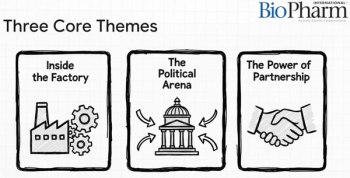
Survey Insights: How Tariffs and Trade Policy Impact Bio/Pharma
This video clips offers topline findings from our survey of nearly 90 bio/pharma professionals on the impacts of Trump-era tariffs and trade policy.
Spanning the first two weeks of August 2025, Pharmaceutical Technology® and Biopharm International® conducted a survey on the impacts of Trump-era tariffs and trade policies on the organizations at which you and your peers in the bio/pharmaceutical industry work. Responses reveal that most perceive tariffs as a major influence on their operations and supply chains, with nearly half reporting significant effects and another large segment anticipating moderate impacts. In navigating these challenges, companies are actively adapting their strategies, primarily by increasing investment in trade compliance and diversifying supply bases, to mitigate risks rather than relying on a single approach, such as reshoring.
This video clip summarizes our key findings.
Video Transcript
*Editor’s Note: This transcript is a direct, unedited rendering of the original audio/video content. It may contain errors, informal language, or omissions as spoken in the original recording.
Welcome to the explainer. If you're in the bio slash pharma industry, you really don't need me to tell you that tariffs and trade policy have been a bit of a roller coaster lately, but how are companies actually handling it all? Well, we're about to jump into a new survey to see exactly what your peers are thinking and doing.
So here's our game plan. We're gonna start with just how big this disruption really is. Then we'll look at the strategic playbook companies are using to adapt. We'll hear directly from your peers about their biggest hurdles, and finally, we'll see what the industry is actually asking for to make things better.
Alright, first up, tariffs as a major disruption. Let's really dig into the scale of this challenge. Let's just start with the headline number, the one that tells you pretty much everything you need to know. 86.2%. That's how many of your peers are saying that tariffs are gonna have a moderate to significant impact on their supply chain.
So, yeah, this isn't some minor headache, right? This is a huge sector-wide issue, and when you break that number down, the story gets even clearer. Just look at this, almost half, nearly 50% are preparing for a significant effects. That tells you that for a lot of companies, probably just like yours, tariff policy isn't just noise in the background.
It's now a primary driver of their operational strategy. So where is this pressure actually being felt the most? Is it just one specific area? Not even close. You can see things like equipment procurement and API sourcing are definitely feeling the heat. But look at that massive 72% pointing to finished product trade.
The impact is being felt all the way across the value chain from getting raw materials right through to the final product, leaving the warehouse. So with this kind of widespread disruption, you have to wonder what are companies actually doing about it. Let's take a look at their strategic playbook.
While for the long haul, the main play seems to be a defensive one. You've got almost half of companies doubling down on trade compliance, basically just trying to navigate these incredibly complex rules, and close to 40% are working to diversify their supplier base, which is a classic move to hedge against risk.
Now, in the immediate short term, things are a little different. It's more of a mixed bag of tactics. You see this blended approach of trying to get regulatory relief through exclusions. Shifting sourcing to countries that aren't tariffed, and for a decent chunk actually investing in domestic manufacturing.
So what's the big takeaway here? It's that there's no single magic bullet. Your pairs are building out this really flexible blended playbook. It's part compliance, part diversification, and part targeted investment, all designed to manage this ongoing uncertainty. But you know, numbers and charts, they only tell half the story.
What does all this disruption actually feel like for the people on the ground day in and day out? The survey's, open-ended responses. They really paint a picture. The first major theme that comes through loud and clear is the direct hit to the wallet. We're talking rising costs and finding it harder to compete in a global market.
It's a straight shot to the bottom line. The second theme, it's the sheer exhaustion. It's trying to plan for the long term. When you're dealing with constant policy, whiplash, the ground is always shifting beneath your feet, and that makes strategic planning almost impossible. And this one, wow. This is a story where that uncertainty turns into a real, tangible and super expensive failure.
A $2 million loss and six weeks of loss production, all because a last minute policy change forced a risky supply chain decision. So given all these challenges, what does the industry actually expect from the future? And maybe more importantly, how prepared do they feel for whatever is coming next?
There's a really strong consensus here. 70% of your peers believe that future administrations will probably soften tariffs, but not get rid of them completely. It really suggests that everyone is settling in for this being the new normal. But here's the catch. Even with that expectation, there's a clear confidence gap.
The vast majority feel they're only partially prepared. That leaves a pretty significant chunk of the industry, nearly one in five, admitting they're just not ready for future policy shifts, leaving them vulnerable. And what's really fascinating is that there's a lot of skepticism that tariffs are even the right tool for the job.
Most of your peers see them as a pretty weak or insufficient policy lever. If the goal is actually to encourage reshoring manufacturing. Okay, so if tariffs aren't the answer, what is. Well, your peers were very, very clear about the kinds of policy changes that would actually help them out. All the responses really boil down to two main ideas.
First, give us policies that make it easier to innovate and do r and d. And second, for goodness sake, create a trade environment that is stable, predictable, and doesn't rely so heavily on tariffs. And this translates into some pretty specific asks. Things like getting rid of tariffs on critical materials like APIs, making customs more efficient.
Protecting intellectual property and making sure that big investments in r and D are actually rewarded long-term. You know, this one response really just ties it all together perfectly. It's a call for a coherent strategy that combines stability with real incentives for domestic innovation. That's what the industry is asking for.
That really leaves us with the final crucial question. This survey shows a clear disconnect between the policy tools being used and what the industry actually needs. It leaves the path forward pretty uncertain, and makes you wonder, will future policy reflect the playbook of the past, or will it finally adapt to the needs of the future?
Newsletter
Stay at the forefront of biopharmaceutical innovation—subscribe to BioPharm International for expert insights on drug development, manufacturing, compliance, and more.




